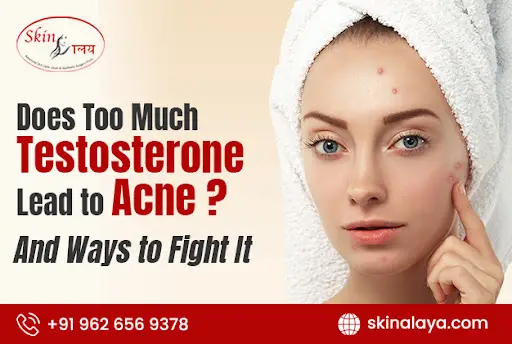
When it comes to the complex web of hormones coursing through our bodies, testosterone often takes center stage. This powerful hormone is primarily associated with masculinity, responsible for the development of male characteristics like a deep voice and facial hair. However, it's not just about macho traits; testosterone plays a crucial role in our overall health.
One of the less celebrated aspects of testosterone is its connection to acne, a skin condition that affects many of us at some point in our lives. In this article, we'll delve into the relationship between testosterone and acne, uncovering how this hormone can lead to those pesky breakouts. More importantly, we'll discuss effective ways to combat acne, regardless of your gender.
Before we dive into the nitty-gritty of testosterone and acne, let's start with the basics. Testosterone is a hormone found in both men and women, although it's typically associated with males. It's responsible for a range of essential functions in the body, including muscle development, bone density, and, yes, the growth of facial hair.
However, testosterone levels can vary significantly from person to person. During puberty, it surges in both boys and girls, causing all sorts of bodily changes. But even beyond adolescence, testosterone continues to ebb and flow, influencing our bodies in various ways.
So, what's the deal with testosterone and acne? Well, here's the lowdown: excess testosterone can wreak havoc on your skin. How? It all comes down to sebum production.
Sebum is an oily substance produced by your sebaceous glands. In moderation, sebum helps keep your skin moisturized and healthy. But when there's an overproduction of sebum, it can lead to clogged pores, setting the stage for acne.
Testosterone has the unfortunate side effect of revving up sebum production. When your body produces too much testosterone, it tells your sebaceous glands to pump out more sebum. This excess oil can mix with dead skin cells and bacteria, creating the perfect breeding ground for pimples, blackheads, and whiteheads.
This explains why acne tends to rear its head during puberty when hormone levels are in flux. But it's not just teenagers who suffer from testosterone-related acne. Women may experience acne during pregnancy or when dealing with hormonal imbalances, such as polycystic ovary syndrome (PCOS). Men, too, can face acne troubles if their testosterone levels are consistently high.
Before we pin all our acne problems on testosterone, it's essential to recognize that it's not the sole culprit. Acne is a complex condition influenced by multiple factors, including genetics, diet, and skincare habits.
Genetics plays a significant role in your predisposition to acne. If your parents struggled with it, you're more likely to as well. Diet matters too; research suggests that consuming excess sugary or greasy foods may exacerbate acne. Your skincare routine can either help or hinder your battle against acne, depending on the products you use and how you care for your skin.
In essence, acne is a multifaceted issue, with testosterone being just one piece of the puzzle. But understanding the role of hormones, especially testosterone, can shed light on why some people are more prone to breakouts than others.
It's vital to know when your testosterone levels might be out of balance. While acne is a potential indicator, it's not the only sign of high testosterone. Other symptoms can include:
It's worth noting that the effects of high testosterone can vary from person to person. Additionally, some individuals may not experience any noticeable symptoms despite having elevated testosterone levels.
It's important to remember that these symptoms can also be caused by various other factors or medical conditions. If you suspect that high testosterone might be contributing to any health issues you're experiencing, it's always best to consult a healthcare professional for a thorough evaluation and appropriate guidance. Hormone levels can be complex, and accurate diagnosis and treatment require expert assessment.
Now that we've explored the connection between testosterone and acne, let's talk about how to tackle those frustrating breakouts.
Making some tweaks to your lifestyle and diet can go a long way in regulating your hormones and managing acne:
A proper skincare routine is essential for managing acne. Here are some tips:
For more severe cases of testosterone-related acne, medical interventions may be necessary. Consult a dermatologist for personalized treatment recommendations, which may include:
In conclusion, managing acne, including potential testosterone-related factors, requires a comprehensive approach. If you suspect high testosterone levels are affecting your skin, or if you're dealing with persistent acne issues, seek professional guidance.
Skinalaya Clinic specializes in dermatological care, offering tailored solutions for healthier skin. Our experienced team is committed to helping you achieve clearer, more confident skin. Take the first step to blemish-free skin by scheduling a consultation with us today.
Don't let acne hold you back; reach out to Skinalaya Clinic and take control of your skin's health. Your path to clearer, acne-free skin starts here.
